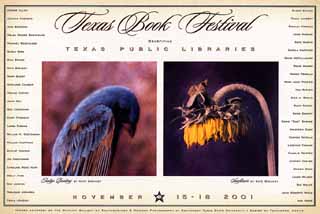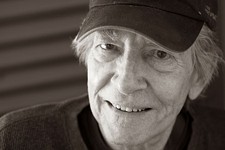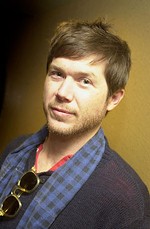New Fest
Why the Texas Book Festival decided to loosen its criteria
By Clay Smith, Fri., Nov. 16, 2001

Several weeks after the September 11 attacks, the executive committee of the Texas Book Festival had to decide what should be done about the 2001 Texas Book Festival in the New Normalcy. The Southern Festival of Books, held in Nashville every October in the Tennessee State Capitol, took place elsewhere because of terrorism fears. The outlook for the Texas Book Festival was grim if it wasn't going to be held at the State Capitol, the venue it has been associated with for the past five years. "It was very depressing to me," says Mary Margaret Farabee, the Festival chairman. "I didn't want to focus on it at all."
"Do we cancel the Festival, do we go on with it at a different location, do we scale it back, we just had a lot of questions," Cyndi Hughes, the Festival's director, recalls.
In the end, Festival organizers met with the Capitol's security force and decided that the Festival would remain at the Capitol but that everyone who attends the Festival this year will have their bags searched. But the inconvenience is worth it, Hughes says, if the Capitol is the setting. "For two days, the Capitol, which is the site of legislation and budgeting, is just turned over to the people and to literature. And lots of people who have never set foot in the Capitol their entire lives are down there wandering around."
More than six years ago, the idea of having a book festival in Texas was very nearly dropped because it seemed that the Capitol could never be used. The Capitol Extension, where the majority of the Festival's panels and readings take place, had just been completed and, according to Farabee, the State Preservation Board was not too keen on the idea of large crowds of people milling about in it. "We just got nowhere in terms of anybody with any power to access the Capitol," Farabee says. The day she went to the Convention Center to see about holding the Festival there is the day she said, "I don't want to do it at the Convention Center. So we virtually dropped it." Then George W. Bush was elected governor and his wife Laura Bush asked Farabee to head up a task force that would give a sense of purpose to this book festival idea people had been telling her about. "She was really key," Farabee says. "Without her and the governor leaning on the Preservation Board, they wouldn't have opened the Capitol."
This spring, as the Festival's Author Selection Committee was talking about the 2001 Festival and which authors they wanted to feature, Dave Hamrick, who used to be a regional community relations manager at Barnes & Noble and has recently become the sales and marketing manager at University of Texas Press, voiced an opinion. After five years, he said, the Festival needed to start thinking a bit more creatively. Authors wanting to be invited to the Book Festival have always had to meet certain criteria, namely that they must have published or written a book in the past two years and that they must be from Texas or be writing about Texas.
"A festival has to have some kind of criteria," Hamrick says, but it seemed to him that the state's prolific authors were being invited every year. The idea to invite an author who didn't write about Texas or even to invite a group of songwriters to discuss their songs seemed, at first, revolutionary.
"Part of the impetus for thinking about ways to beef up our programming came from the idea that with the Texas focus, with great books coming out of Texas and the variety we have, there's not every year five to 10 headlining authors from Texas who would draw huge crowds," Hughes says. "So what we were hoping to do was to give those Texas authors even a better chance at having big crowds there." (Full disclosure: I'm a member of the Author Selection Committee.)
But why did a book festival founded on the notion of spotlighting the state's authors come to the consensus that those authors aren't bringing in enough crowds? Hamrick says instead of excluding Texas writers, the loosening of the Festival criteria this year to allow more non-Texas writers puts Texas writers "on the same platform" as a national writer or non-Texan. "And I think that's a good thing," he says. "Out of 130-and-some authors, maybe 10 to 20 don't have obvious Texas ties," Hughes says, as she points out that she gets complaints about the Festival not being Texan enough every year. "Even though [critics] may say, 'Well, you didn't bring in Larry McMurtry' or 'Andrew Vachss and Denise Chávez aren't Texas writers,' the numbers are still overwhelmingly fitting within our guidelines." (Mary Margaret Farabee says that "Larry McMurtry has put it in writing to me that he's done the Texas Book Festival twice and that's it.")
Some of the ways in which the 2001 Book Festival has changed include a panel on Saturday afternoon titled "Stories in Song: Texas Songwriters," featuring Shawn Colvin, Joe Ely, Jimmie Dale Gilmore, and Butch Hancock talking about the sources of their songs and probably performing a few of them. None of them have books to sell (the sales of books from the Book Festival -- in fact, all of the Festival's income after operating costs are paid for -- are donated to Texas libraries). Because Willie Morris "was such a great influence on Texas writers," as Hughes says, there will be a panel on Sunday afternoon that is simply intended to be a tribute to the former Harper's editor and UT graduate. For the first time this year, there's a panel about publishing: "From Manuscript to Marketing: An Insider's View of Publishing" features Sarah Bird, author of The Yokota Officer's Club, New York literary agent Henry Dunow, and Southwest Texas State creative writing program director Tom Grimes as moderator.
A free event at Mojo's Daily Grind on Friday night titled After Hours, which, for the record, the Chronicle is sponsoring, features detective novelist Andrew Vachss, novelist and short story writer Mark Jude Poirier, and first-time novelist and New York writer Angie Cruz, as well as performance poet Gary Glazner and the Austin and Dallas poetry slam teams duking it out for verbal supremacy. We feature the prose authors below.








